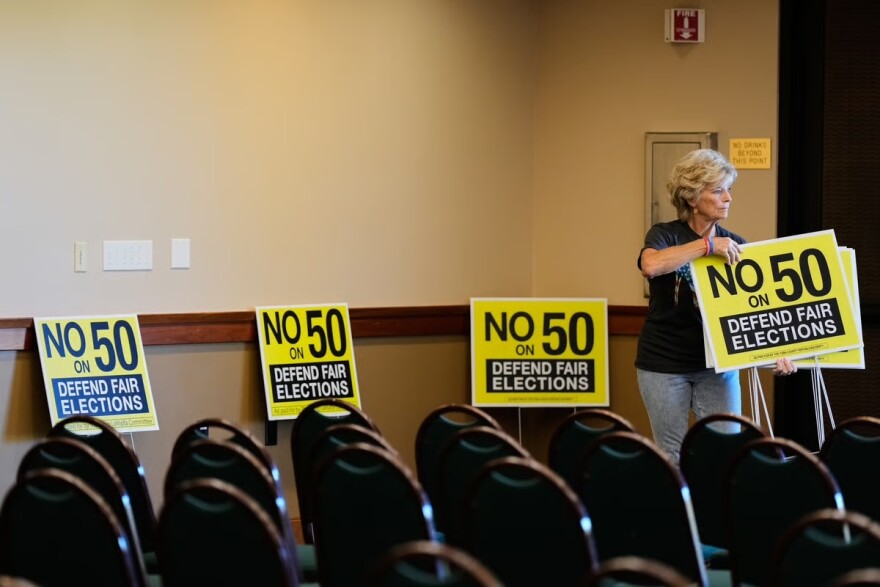A federal court blocked a GOP-led redistricting proposal in Texas on Tuesday, ruling the new congressional map amounts to unconstitutional racial gerrymandering. But political and election experts say the decision has no impact on California’s voter-approved effort to redraw its own congressional lines.
The court ruling blocks Texas’ new map from going into effect for the 2026 midterm elections. It aims to create five new districts favoring Republicans in the state. Texas Governor, Republican Greg Abbott appealed the ruling to the U.S. Supreme Court.
“Trump and Greg Abbott played with fire, got burned — and democracy won. This ruling is a win for Texas, and for every American who fights for free and fair elections,” California Governor Gavin Newsom said in a statement, reacting to Tuesday’s ruling.
This comes just weeks after California voters overwhelmingly approved Proposition 50, which proponents, including Newsom, argued was necessary to counteract the Texas redistricting plan.
But, Tuesday’s ruling in Texas doesn’t change Prop 50’s implementation in California.
Redistricting expert Paul Mitchell, who worked on the team responsible for drafting the map adopted through Prop 50, explained in a post on X.
“Since everyone is asking: No, this doesn't undo #Prop50. The trigger language was removed in the legislative process as it was clear that TX was redistricting. So, even if their map is invalidated/postponed, the Prop 50 maps stay in place,” wrote Mitchell.
Mitchell referred to a “trigger clause” state lawmakers removed from the redistricting legislation before it went to voters. It would have made Prop 50’s implementation contingent on Texas or another red state going through with redistricting plans of their own. Absent the language, California’s new map will go into effect regardless of what happens in other states, according to legal experts.
Texas was directly mentioned in the Prop 50 ballot language for California’s special election, but the new map will still take effect for next year’s midterms regardless of whether the Texas plan goes through.
“So no matter what happens in Texas, Prop 50, absent the federal courts intervening, is the law of the land now temporarily,” explained Chris Micheli, professor of California politics and law at McGeorge Law School.
Temporarily, because the state’s Independent Citizens Redistricting Commission will take back the redistricting reins after the 2030 census.
Republican Congressman Kevin Kiley said he opposed Texas’ redistricting plan from the start.
“I certainly think that any members of my own party who engaged in gerrymandering, I disagree with that,” Kiley said. “I also disagree with members of the other party who engaged in it. I think it's wrong everywhere.”
Kiley’s district that currently stretches from Placer County down the Eastern Sierra to Death Valley is one of the five set to change under the Prop 50 map. He introduced legislation this summer to ban mid-decade redistricting nationwide, though Republican leadership in the U.S. House hasn’t moved to take a vote on the measure.
“I think that honestly we could still try to find a solution to this even at this late date with the uncertainty in the Texas case as well as the challenge in California,” Kiley added.
Republicans still challenge California’s proposal
California’s Republican Party and the federal Department of Justice have challenged Proposition 50 through a lawsuit still pending in federal court.
The parties argue California’s new map violates the Voting Rights Act because it disproportionately benefits Latinos, the reverse of what opponents to the Texas redistricting plan alleged in their lawsuit.
“In a bit of irony, the two legal challenges currently pending in Texas over their redistricting have been brought forth by minority legal organizations claiming that the Texas redistricting actually suppresses minority voters,” said Micheli. “Obviously, the federal government hasn't chosen to weigh in there.”
An independent analysis conducted by the Public Policy Institute of California (PPIC) found the Prop 50 congressional map would result in 16 majority-Latino districts, the same number as the current map drawn by the Independent Citizens Redistricting Commission. The PPIC analysis also indicates the proposed map could result in one additional “influence” district for Latinos.
Micheli said based on the analysis, it doesn’t appear the new map was drawn specifically to favor a certain minority group in conflict with the Voting Rights Act.
“If there's no actual showing that Latino voters were somehow enhanced in violation of federal constitutional law, then I think the case fails on the merits,” said Micheli.


